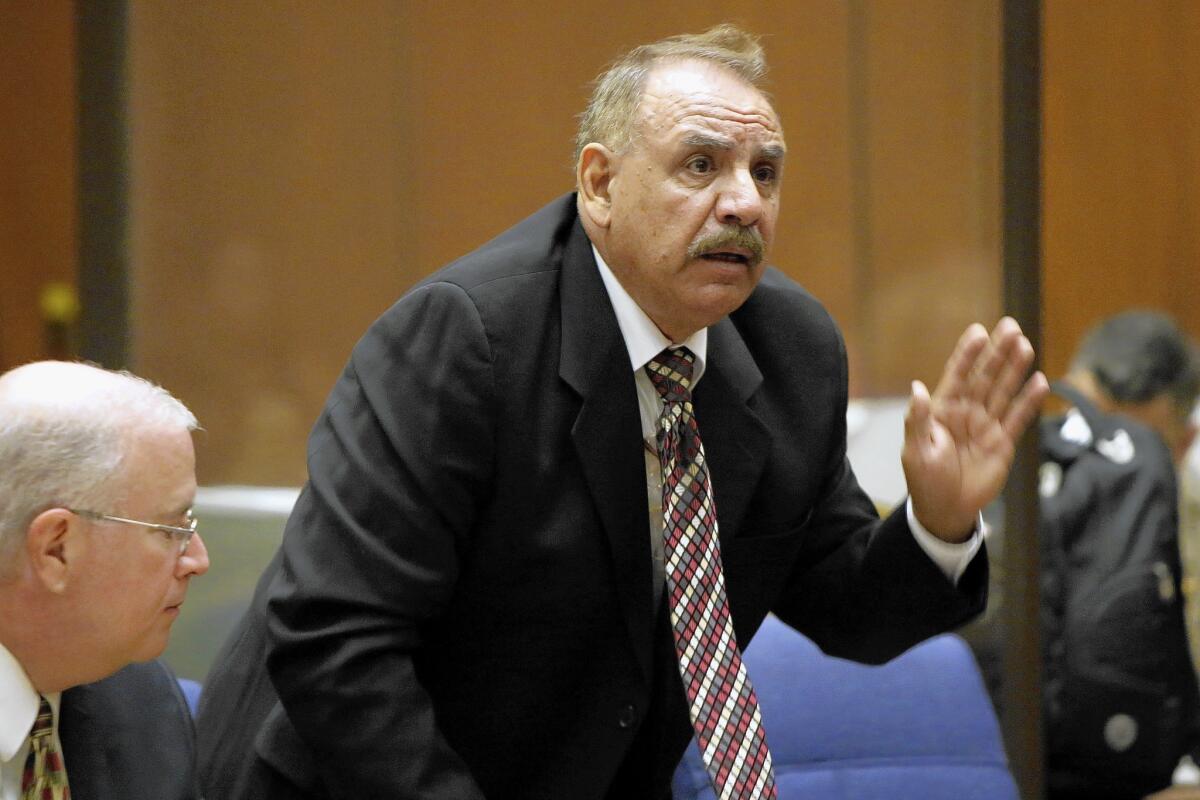Former Bell mayor sentenced to year in jail in corruption case

After the battering ram splintered his door and he was handcuffed and taken into custody, Oscar Hernandez ignored his attorney’s advice and confessed that he and other Bell council members had paid themselves huge salaries for sitting on boards that often never met.
“What kind of value were the taxpayers of Bell getting for $100,000 a year?” asked an investigator in September 2010, referring to Hernandez’s annual paycheck.
“I know. Lousy. I understand that very well,” Hernandez replied.
The former mayor’s contrition and cooperation came into sharp focus Thursday when the onetime grocery store owner was ordered to serve one year in the county jail, a sentence that could mean only weeks behind bars.
One of his colleagues in the municipal corruption case was given two years in state prison; the administrators who ran the city as it plunged toward bankruptcy received a dozen years each. Hernandez had faced a four-year prison term, a sentence the judge suspended.
“Do I think you are the absolute worst of the worst? No,” Los Angeles County Superior Court Judge Kathleen Kennedy said. “I think you’ve done wrong. I think there were others that were far more manipulative and got far more ill-gotten gains than you did.”
She also addressed Hernandez’s defense that he had only a sixth-grade education and his limited English skills were exploited when Robert Rizzo, the city administrator, was in need of signatures on documents.
“If you didn’t have the ability and the skills to do the job, then you shouldn’t have run for the job,” Kennedy said.
Earlier, Hernandez, 66, made a brief apology to the court. “I just want to say I’m sorry for not being so aggressive in my questions to the people when I was in charge in the office,” he said. “And I take all the blame; I put blame on myself.”
Now living in a trailer in Paramount and volunteering at a Downey food bank, Hernandez has removed himself from the city that once served as the backdrop for his immigrant success story.
Leaving Mexico as a teenager, Hernandez at first picked crops on Central Valley farms. Later, he went to work at a foundry in Vernon. In the 1980s, he and his wife moved their four children to Bell and bought a grocery store. Back then, Bell was predominantly white and the couple struggled to attract customers, selling trinkets at swap meets on the side.
Hernandez became a community activist after he felt he was being treated unfairly by city officials who threatened to take his store through eminent domain. He was soon a popular figure, known for his thick mustache, generosity and gift for gab.
By 2003, he was on the City Council, a part-time job that came with a $673 monthly paycheck. But Hernandez and five other former council members were eventually accused of illegally helping themselves to the town’s treasury by passing resolutions that ratcheted up their pay.
Deputy Dist. Atty. Sean Hassett said Hernandez deserved prison time because he had been the mayor and “figurehead” of the scandal. Hassett reminded the court that the former grocer at first defended Rizzo’s $800,000 salary.
But Hernandez’s attorney, Stanley L. Friedman, insisted that his client had quickly changed his opinion, adding that his confession helped prosecutors create “a blueprint for the people’s case.” Friedman called the sentence a “miracle” compared with what Hernandez faced when first charged.
Still, Hernandez’s children felt the sentence was unfair.
“He didn’t know what was going on,” said Lena Hernandez, 39. “It was Mr. Rizzo’s wrongdoing and my father was lied to.”
Agustin Hernandez, 34, made a tearful speech in court in support of his father, and said the family had been ostracized and threatened. “My dad doesn’t walk around like nothing happened. We walk around with shame.”
Scheduled to be taken into custody Aug. 29, Hernandez must also pay $241,000 in restitution to Bell.
He declined to speak outside the courtroom, but Hernandez’s thoughts were revealed in a four-page letter asking for mercy, dictated to his son and submitted to Kennedy:
“i want a chance ur honor, a chance to move forward with my life, to walk out of my house and not think about what’s the paper going to say about this case.”
More to Read
Sign up for Essential California
The most important California stories and recommendations in your inbox every morning.
You may occasionally receive promotional content from the Los Angeles Times.











